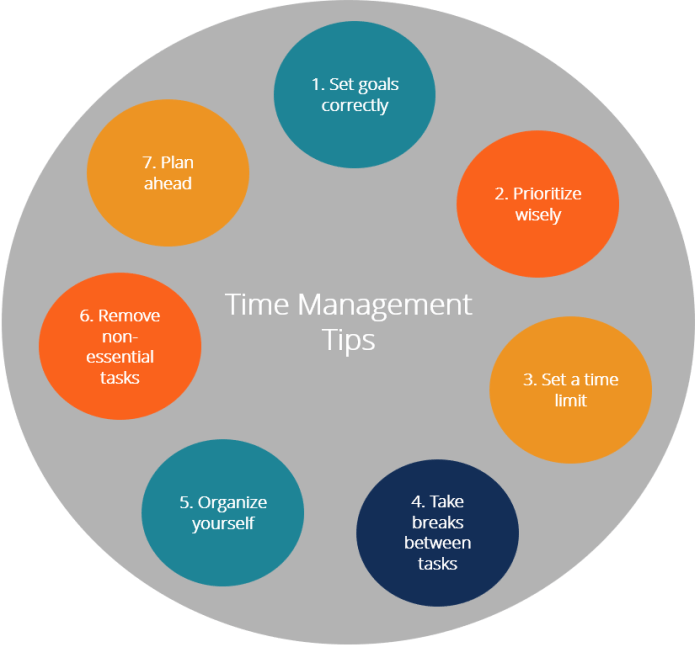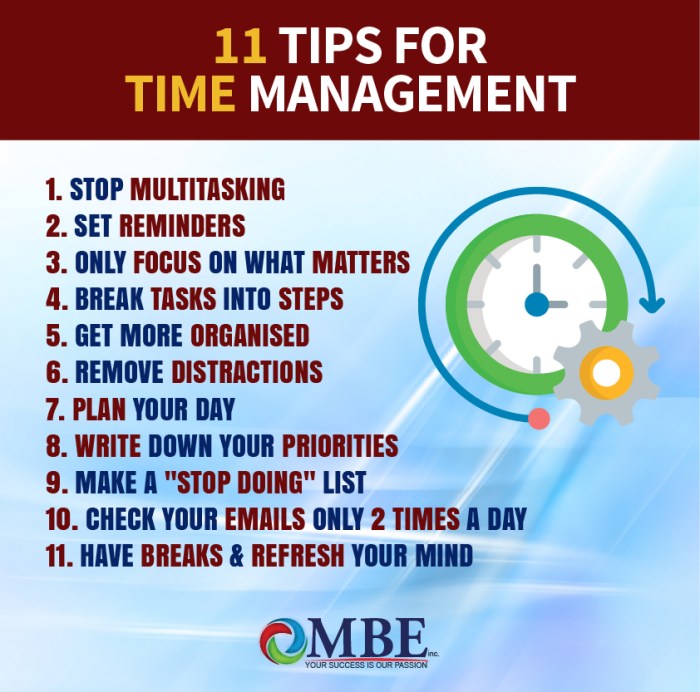Time Management Tips: With this guide, get ready to rock your schedule like a boss, avoiding the stress and maximizing productivity. Dive into the world of effective time management techniques and strategies that will set you up for success in no time.
Importance of Time Management
Time management is crucial for personal and professional success as it allows individuals to prioritize tasks, set goals, and make the most out of their day. By effectively managing time, individuals can reduce stress levels, increase productivity, and achieve a better work-life balance.
Reducing Stress and Increasing Productivity
- Effective time management helps individuals stay organized and focused, leading to a reduction in stress levels.
- By allocating time to specific tasks and avoiding procrastination, individuals can accomplish more in less time, thus increasing productivity.
- Setting realistic goals and deadlines can motivate individuals to work efficiently and achieve better results.
Negative Consequences of Poor Time Management
- Poor time management can lead to missed deadlines, which can result in negative consequences such as loss of opportunities or damaged professional relationships.
- Individuals who struggle with time management may experience increased stress, decreased productivity, and feelings of overwhelm.
- Procrastination, a common result of poor time management, can lead to rushed work, lower quality output, and missed opportunities for growth and advancement.
Strategies for Effective Time Management
Effective time management is crucial for success in any endeavor. By utilizing various techniques and tools, individuals can optimize their productivity and achieve their goals efficiently. Let’s explore some strategies that can help in managing time effectively.
The Pomodoro Technique
The Pomodoro Technique is a time management method that involves breaking work into intervals, typically 25 minutes in length, separated by short breaks. This technique helps in maintaining focus and increasing productivity by working in short, focused bursts.
Eisenhower Matrix
The Eisenhower Matrix, also known as the Urgent-Important Matrix, is a tool for prioritizing tasks based on their urgency and importance. By categorizing tasks into quadrants, individuals can identify what needs immediate attention and what can be delegated or eliminated.
Time Blocking
Time blocking involves scheduling specific blocks of time for different tasks or activities. By allocating dedicated time slots for work, study, exercise, and leisure, individuals can ensure that each aspect of their life receives adequate attention and focus.
Setting Priorities and Creating To-Do Lists
Setting priorities and creating to-do lists are essential components of effective time management. By identifying key tasks and organizing them based on importance and urgency, individuals can stay on track and avoid feeling overwhelmed by a long list of responsibilities.
Significance of Setting SMART Goals
Setting SMART goals – Specific, Measurable, Achievable, Relevant, Time-bound – is crucial for effective time management. By defining clear objectives and establishing a timeline for completion, individuals can track their progress and make necessary adjustments to ensure success.
Tips for Avoiding Procrastination

Procrastination is a common challenge that many people face, but with the right strategies, it can be overcome. By staying focused on tasks, breaking them into smaller parts, and creating a conducive work environment, you can improve your time management skills and productivity.
Strategies to Overcome Procrastination, Time Management Tips
- Avoid multitasking and focus on one task at a time to prevent feeling overwhelmed.
- Set specific, achievable goals with deadlines to hold yourself accountable.
- Use tools like time tracking apps or to-do lists to stay organized and on track.
Breaking Tasks into Manageable Parts
- Divide tasks into smaller subtasks to make them more manageable and less intimidating.
- Prioritize tasks based on urgency and importance to ensure you are working on the most critical items first.
- Take short breaks in between tasks to avoid burnout and maintain focus throughout the day.
Creating a Conducive Work Environment
- Minimize distractions by setting up a designated workspace free from noise and interruptions.
- Establish a routine or schedule to create a sense of structure and discipline in your workday.
- Practice mindfulness and stay present in the moment to avoid getting sidetracked by external factors.
Balancing Work and Personal Life: Time Management Tips

Maintaining a healthy work-life balance is crucial for overall well-being and productivity. Effective time management plays a key role in achieving this balance by helping individuals allocate time appropriately to work, personal life, and self-care.
Setting Boundaries and Saying No
Setting boundaries is essential to prevent work from encroaching on personal time. Learning to say no to additional commitments or tasks is necessary to avoid overcommitting and feeling overwhelmed. By setting clear boundaries and prioritizing tasks, individuals can create a more balanced lifestyle.
- Establish specific work hours and stick to them to create a clear separation between work and personal time.
- Communicate your boundaries to colleagues, friends, and family members to ensure they respect your time and commitments.
- Practice assertiveness and learn to decline requests or invitations that do not align with your priorities.
Rejuvenating Activities and Hobbies
Engaging in activities or hobbies outside of work can help reduce stress, improve mental health, and enhance overall well-being. These activities provide an opportunity to relax, unwind, and recharge, leading to increased productivity and happiness.
- Exercise regularly to boost energy levels and reduce stress.
- Spend quality time with loved ones to foster relationships and create meaningful connections.
- Pursue hobbies or interests that bring joy and fulfillment, such as painting, gardening, or playing musical instruments.